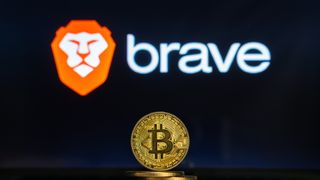Brave private browser accused of deceiving users over affiliate links
Brave private browser accused of deceiving users over affiliate links

The Chromium-based, privacy-minded spider web browser Brave has been accused of deceiving users by autocompleting typed-in URLs for cryptocurrency companies to versions of the URLs from which information technology gains affiliate revenue.
This is despite the fact that Brave positions itself as a "secure, fast and private web browser" that blocks "data-grabbing ads" and trackers.
- Best VPN: keep your individual data private with a VPN
- Antivirus: go on protected when online with the best software
- Only in: Federal agencies hit past fewer cyberattacks in 2019
According to a report by Decrypt, the browser failed to notify its 15 million users that it may employ the browser-based URL-autocomplete function to steer user to affiliate links.
The alleged deception was originally unearthed on Twitter by user Yannick Eckl, who said that he learnt that the the URL for cryptocurrency exchange Binance autocompleted to an affiliate link despite his not being made aware of this exercise.
He tweeted: "So when you are using the @dauntless browser and type in "binance[.]us" you end upward getting redirected to "binance[.]us/en?ref=35089877" - I see what you did there mates".
So when you are using the @brave browser and blazon in "binance[.]us" you stop up getting redirected to "binance[.]us/en?ref=35089877" - I see what you did at that place mates 😂June half-dozen, 2020
But the redirect links didn't stop there. Dimitar Dinev, managing director of JRR crypto, and cryptocurrency reporter Larry Cermak plant similar autocomplete functions leading to affiliate links on websites such equally Coinbase, Trezor and Ledger.
Looks like information technology's not a very isolated mistake. Brave as well does this for Ledger, Trezor and Coinbase if y'all expect in their Github https://t.co/8PpnlS5jAu https://t.co/JGQ7d23fer pic.twitter.com/keorBZiDJLJune 6, 2020
Mea culpa
In a serial of tweets, Brave Software CEO Brendan Eich apologised for the outcome.
According to 1 of the tweets: "The autocomplete default was inspired by search query clientid attribution that all browsers do, only unlike keyword queries, a typed-in URL should go to the domain named, without whatever additions. Deplorable for this mistake — we are clearly not perfect, merely we right course quickly."
Still, Eich explained the reasoning behind the links: "With Dauntless, we're trying to build a feasible business that puts users starting time past aligning interests via individual ads that pay user >= what we make on fixed fee schedule, no browser data in the clear on whatever of our servers, and and then on. But we seek skin-in-game affiliate revenue too.
"This includes bringing new users to Binance & other exchanges via opt-in trading widgets/other UX that preserves privacy prior to opt-in. It includes search revenue deals, equally all major browsers do. When we do this well, information technology'south a win for all parties. Our users desire Brave to live."
i/ We made a mistake, we're correcting: Brave default autocompletes verbatim "https://t.co/hJd0ePInEw" in address bar to add an affiliate code. We are a Binance affiliate, we refer users via the opt-in trading widget on the new tab page, but autocomplete should not add any code.June 6, 2020
Eich is famous for creating the JavaScript web-coding language that your browser is likely using correct now, and for developing and creating the Firefox web browser and its parent company the Mozilla Foundation.
He left Mozilla in 2014 later his past donations to political campaigns opposing the legalization of same-sex marriage became publicized, and founded Brave Software.
- Online security without the price - see the all-time free VPN services
Source: https://www.tomsguide.com/news/brave-affiliate-links-autocomplete
Posted by: gaymanwholoney.blogspot.com


0 Response to "Brave private browser accused of deceiving users over affiliate links"
Post a Comment